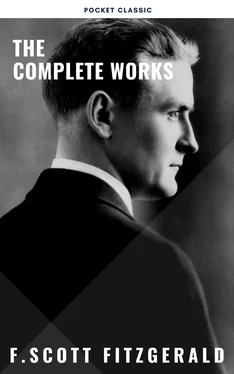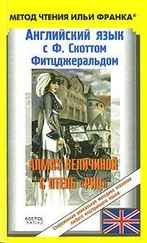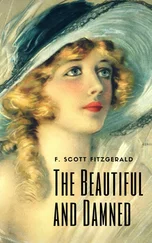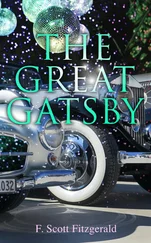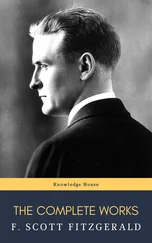F. Scott Fitzgerald - The Complete Works of F. Scott Fitzgerald
Здесь есть возможность читать онлайн «F. Scott Fitzgerald - The Complete Works of F. Scott Fitzgerald» — ознакомительный отрывок электронной книги совершенно бесплатно, а после прочтения отрывка купить полную версию. В некоторых случаях можно слушать аудио, скачать через торрент в формате fb2 и присутствует краткое содержание. Жанр: unrecognised, на английском языке. Описание произведения, (предисловие) а так же отзывы посетителей доступны на портале библиотеки ЛибКат.
- Название:The Complete Works of F. Scott Fitzgerald
- Автор:
- Жанр:
- Год:неизвестен
- ISBN:нет данных
- Рейтинг книги:4 / 5. Голосов: 1
-
Избранное:Добавить в избранное
- Отзывы:
-
Ваша оценка:
- 80
- 1
- 2
- 3
- 4
- 5
The Complete Works of F. Scott Fitzgerald: краткое содержание, описание и аннотация
Предлагаем к чтению аннотацию, описание, краткое содержание или предисловие (зависит от того, что написал сам автор книги «The Complete Works of F. Scott Fitzgerald»). Если вы не нашли необходимую информацию о книге — напишите в комментариях, мы постараемся отыскать её.
The first table of contents (at the very beginning of the ebook) lists the titles of all novels included in this volume. By clicking on one of those titles you will be redirected to the beginning of that work, where you'll find a new TOC that lists all the chapters and sub-chapters of that specific work.
The Complete Works of F. Scott Fitzgerald — читать онлайн ознакомительный отрывок
Ниже представлен текст книги, разбитый по страницам. Система сохранения места последней прочитанной страницы, позволяет с удобством читать онлайн бесплатно книгу «The Complete Works of F. Scott Fitzgerald», без необходимости каждый раз заново искать на чём Вы остановились. Поставьте закладку, и сможете в любой момент перейти на страницу, на которой закончили чтение.
Интервал:
Закладка:
He got to his feet with the idea of retracing his steps but before turning he stood for a minute in the moonlight looking down the road. Across the track stretched the line of telephone poles and, as his eyes followed them as far as he could see, he heard again, louder now and not far away, the siren of the New York train which rose and fell with musical sharpness on the still night. Suddenly his eyes, which had been traveling down the tracks, stopped and were focused suddenly upon one spot in the line of poles, perhaps a quarter of a mile away. It was a pole just like the others and yet it was different—there was something about it that was indescribably different.
And watching it as one might concentrate on some figure in the pattern of a carpet, something curious happened in his mind and instantly he saw everything in a completely different light. Something had come to him in a whisper of the breeze, something that changed the whole complexion of the situation. It was this: He remembered having read somewhere that at some point back in the dark ages a man named Gerbert had all by himself summed up the whole of European civilization. It became suddenly plain to Michael that he himself had just now been in a position like that. For one minute, one spot in time, all the mercy in the world had been vested in him.
He realized all this in the space of a second with a sense of shock and instantly he understood the reason why he should have helped Charley Hart. It was because it would be intolerable to exist in a world where there was no help—where any human being could be as alone as Charley had been alone this afternoon.
Why, that was it, of course—he had been trusted with that chance. Someone had come to him who had no other place to go—and he had failed.
All this time, this moment, he had been standing utterly motionless staring at the telephone pole down the track, the one that his eye had picked out as being different from the others. The moon was so bright now that near the top he could see a white bar set crosswise on the pole and as he looked the pole and the bar seemed to have become isolated as if the other poles had shrunk back and away.
Suddenly a mile down the track he heard the click and clamor of the electric train when it left the station, and as if the sound had startled him into life he gave a short cry and set off at a swaying run down the road, in the direction of the pole with the crossed bar.
The train whistled again. Click—click—click—it was nearer now, six hundred, five hundred yards away and as it came under the bridge he was running in the bright beam of its searchlight. There was no emotion in his mind but terror—he knew only that he must reach that pole before the train, and it was fifty yards away, struck out sharp as a star against the sky.
There was no path on the other side of the tracks under the poles but the train was so close now that he dared wait no longer or he would be unable to cross at all. He darted from the road, cleared the tracks in two strides and with the sound of the engine at his heels raced along the rough earth. Twenty feet, thirty feet—as the sound of the electric train swelled to a roar in his ears he reached the pole and threw himself bodily on a man who stood there close to the tracks, carrying him heavily to the ground with the impact of his body.
There was the thunder of steel in his ear, the heavy clump of the wheels on the rails, a swift roaring of air, and the nine-thirty train had gone past.
“Charley,” he gasped incoherently, “Charley.”
A white face looked up at him in a daze. Michael rolled over on his back and lay panting. The hot night was quiet now—there was no sound but the faraway murmur of the receding train.
“Oh, God!”
Michael opened his eyes to see that Charley was sitting up, his face in his hands.
“S’all right,” gasped Michael, “s’all right, Charley. You can have the money. I don’t know what I was thinking about. Why—why, you’re one of my oldest friends.”
Charley shook his head.
“I don’t understand,” he said brokenly. “Where did you come from—how did you get here?”
“I’ve been following you. I was just behind.”
“I’ve been here for half an hour.”
“Well, it’s good you chose this pole to—to wait under. I’ve been looking at it from down by the bridge. I picked it out on account of the crossbar.”
Charley had risen unsteadily to his feet and now he walked a few steps and looked up the pole in the full moonlight.
“What did you say?” he asked after a minute, in a puzzled voice. “Did you say this pole had a crossbar?”
“Why, yes. I was looking at it a long time. That’s how—”
Charley looked up again and hesitated curiously before he spoke.
“There isn’t any crossbar,” he said.
— ◆ —
A Penny Spent.
(The Saturday Evening Post, 10 October 1925)
The Ritz Grill in Paris is one of those places where things happen—like the first bench as you enter Central Park South, or Morris Gest’s office, or Herrin, Illinois. I have seen marriages broken up there at an ill-considered word and blows struck between a professional dancer and a British baron, and I know personally of at least two murders that would have been committed on the spot but for the fact that it was July and there was no room. Even murders require a certain amount of space, and in July the Ritz Grill has no room at all.
Go in at six o’clock of a summer evening, planting your feet lightly lest you tear some college boy bag from bag, and see if you don’t find the actor who owes you a hundred dollars or the stranger who gave you a match once in Red Wing, Minnesota, or the man who won your girl away from you with silver phrases just ten years ago. One thing is certain—that before you melt out into the green-and-cream Paris twilight you will have the feel of standing for a moment at one of the predestined centers of the world.
At seven-thirty, walk to the center of the room and stand with your eyes shut for half an hour—this is a merely hypothetical suggestion—and then open them. The grey and blue and brown and slate have faded out of the scene and the prevailing note, as the haberdashers say, has become black and white. Another half hour and there is no note at all—the room is nearly empty. Those with dinner engagements have gone to keep them and those without any have gone to pretend they have. Even the two Americans who opened up the bar that morning have been led off by kind friends. The clock makes one of those quick little electric jumps to nine. We will too.
It is nine o’clock by Ritz time, which is just the same as any other time. Mr. Julius Bushmill, manufacturer; b. Canton, Ohio, June 1, 1876; m. 1899, Jessie Pepper; Mason; Republican; Congregationalist; Delegate M. A. of A. 1908; pres. 1909–1912; director Grimes, Hansen Co. since 1911; director Midland R. R. of Indiana—all that and more—walks in, moving a silk handkerchief over a hot scarlet brow. It is his own brow. He wears a handsome dinner coat but has no vest on because the hotel valet has sent both his vests to the dry-cleaners by mistake, a fact which has been volubly explained to Mr. Bushmill for half an hour. Needless to say the prominent manufacturer is prey to a natural embarrassment at this discrepancy in his attire. He has left his devoted wife and attractive daughter in the lounge while he seeks something to fortify his entrance into the exclusive and palatial dining room.
The only other man in the bar was a tall, dark, grimly handsome young American, who slouched in a leather corner and stared at Mr. Bushmill’s patent-leather shoes. Self-consciously Mr. Bushmill looked down at his shoes, wondering if the valet had deprived him of them too. Such was his relief to find them in place that he grinned at the young man and his hand went automatically to the business card in his coat pocket.
Читать дальшеИнтервал:
Закладка:
Похожие книги на «The Complete Works of F. Scott Fitzgerald»
Представляем Вашему вниманию похожие книги на «The Complete Works of F. Scott Fitzgerald» списком для выбора. Мы отобрали схожую по названию и смыслу литературу в надежде предоставить читателям больше вариантов отыскать новые, интересные, ещё непрочитанные произведения.
Обсуждение, отзывы о книге «The Complete Works of F. Scott Fitzgerald» и просто собственные мнения читателей. Оставьте ваши комментарии, напишите, что Вы думаете о произведении, его смысле или главных героях. Укажите что конкретно понравилось, а что нет, и почему Вы так считаете.
